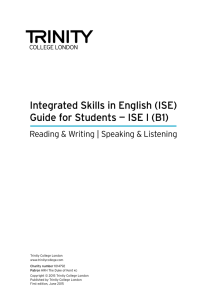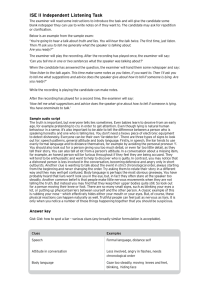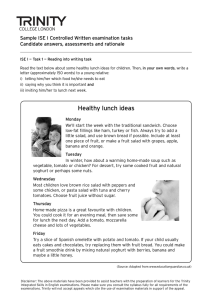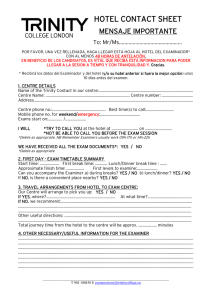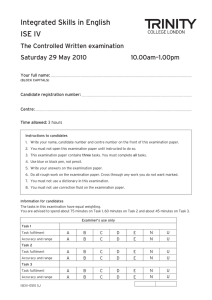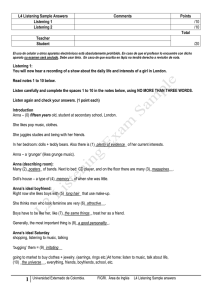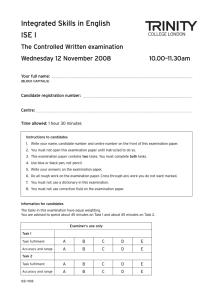ISE I (B1) - Trinity College London
Anuncio
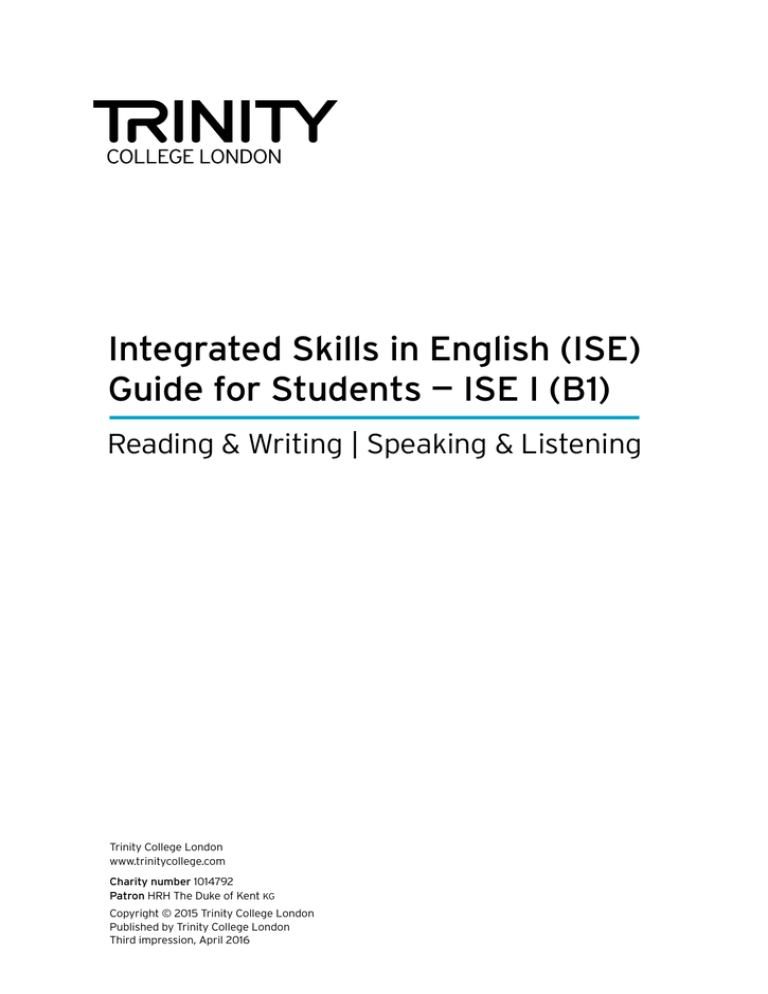
Integrated Skills in English (ISE) Guide for Students — ISE I (B1) Reading & Writing | Speaking & Listening Trinity College London www.trinitycollege.com Charity number 1014792 Patron HRH The Duke of Kent KG Copyright © 2015 Trinity College London Published by Trinity College London Third impression, April 2016 Foreword Trinity’s Integrated Skills in English (ISE) exams assess all four language skills — reading, writing, speaking and listening — in a way that reflects real-life communication in English. This guide: ◗◗ gives a summary of both modules of the ISE I exam — Reading & Writing and Speaking & Listening ◗◗ gives you some ideas on how to prepare for the ISE I exam ◗◗ tells you what the examiner is looking for ◗◗ tells you about results and certificates. Please check trinitycollege.com/ISE for the latest information about Trinity’s ISE exams, and to make sure you are using the latest version of the related documents. 2 Contents Contents What is ISE I? 4 ISE I summary 6 Reading & Writing 6 Speaking & Listening 7 How to prepare for ISE I 10 Reading & Writing Speaking & Listening What happens on the day of the exam? 10 11 12 Reading & Writing 12 Speaking & Listening 13 What is the examiner assessing in ISE I? 14 Reading 14 Writing 14 Speaking 15 Listening 15 Your ISE I qualification certificate 16 3 What is ISE I? What is ISE I? ISE I is an English language exam for learners of English who are at level B1 of the Common European Framework of Reference. You take ISE I in two parts — Reading & Writing and Speaking & Listening. Reading & Writing Speaking & Listening Who recognises ISE? Many institutions recognise ISE as proof that you can read, write, speak and listen in English. To find out more visit: www.trinitycollege.com/recognition 4 What is ISE I? What do I get when I pass a module? When you pass an ISE module, you get a module certificate: Sa m pl e Trinity College London Sa m pl e Trinity College London Module Certificate Module Certificate Bartlett Paudini Bartlett Paudini has achieved has achieved ISE I Reading & Writing Module ISE I Speaking & Listening Module CEFR Level B1 CEFR Level B1 This module is part of the Integrated Skills in English qualification This module is part of the Integrated Skills in English qualification Reading - Distinction Writing - Distinction Speaking - Distinction Listening - Merit Ferguson Centre - October 2015 Certificate issued 16 October 2015 Ferguson Centre - November 2015 Certificate issued 2 November 2015 Trinity ID: 4-56891177: 9-89745811 Candidate number: 9-89745811 Trinity ID: 4-56891177: 9-89745811 Candidate number: 9-89745811 Reading & Writing certificate Speaking & Listening certificate When do I receive the ISE I qualification certificate? After you have passed both ISE I Reading & Writing and ISE I Speaking & Listening, you receive the ISE I qualification certificate, which shows your results in all four skills. Sa m pl e Trinity College London Bartlett Paudini is awarded ISE I Integrated Skills in English CEFR Level B1 Entry Level Certificate in ESOL International (Entry 3)* Reading Writing Speaking Listening Distinction Distinction Distinction Merit October 2015 October 2015 November 2015 November 2015 Certificate issued 5 November 2015 Sarah Kemp Chief Executive, Trinity College London Patron HRH The Duke of Kent KG *Level refers to the National Qualifications Framework in England, Wales and Northern Ireland Qualification number: 601/5515/2 Trinity ID: 4-56891177: 9-89745811 Candidate number: 9-89745811 ISE qualification certificate 5 ISE I summary ISE I summary Reading & Writing How long is the Reading & Writing exam? Two hours. Which skills do the reading tasks test? Reading for gist, reading for details, reading comprehension, and understanding the main ideas of a text. Which skills do the writing tasks test? How you organise a text, your range of language functions, grammar and vocabulary, how well you answer the question, and how you transform reading texts into a writing text. The Reading & Writing exam has four parts: Task 1 — Long reading How many texts? One text. How long is the text? About 400 words. How many questions? 15 questions. There are three types of question: ◗◗ questions 1–5 — choose the right heading for each paragraph of the reading text ◗◗ questions 6–10 — decide which five statements from a list of eight are true according to the text — three are false or not stated in the text ◗◗ questions 11–15 — complete sentences with words from the reading text. Task 2 — Multi-text reading How many texts? Four short texts. How long are the texts? In total, the four texts are about 400 words. One of the texts is an infographic. How many questions? 15 questions. There are three types of question: ◗◗ questions 16–20 — choose which text matches a description — there are five questions which describe the main idea or purpose of the texts ◗◗ questions 21–25 — decide which five statements from a list of eight are true according to the texts — three are false or not stated in the texts ◗◗ questions 26–30 — complete summary notes with words from the texts — the notes are a summary of the four texts. Task 3 — Reading into writing How many texts do I read? You use the four texts from task 2. What do I write? A descriptive essay, discursive essay or article (magazine or online). How many words do I write? 100–130 words. You can only use information from the texts in task 2 in your answer. Your answer must be in your own words and not copied from the texts. Task 4 — Extended writing What do I write? A descriptive essay, discursive essay, article (magazine or online), email or letter (informal or formal) or review. How many words do I write? 100–130 words. To see sample Reading & Writing exams, please go to: www.trinitycollege.com/ISEI 6 ISE I summary Speaking & Listening The Speaking & Listening exam is a one-to-one interview with a Trinity examiner. The exam is in three parts: ISE Speaking & Listening exam Topic task Conversation task (4 minutes) (2 minutes) Independent listening tasks (10 minutes) Topic task (4 minutes) To prepare for the exam, prepare to talk about a topic. You can choose what you want to talk about, for example, your interests, a musical instrument, a game, or a favourite gadget. How do you choose a topic? Think of three different possible topics that you can talk to the examiner about. 1. 2. 3. What can you say about each possible topic? Which one shows your English skills the best? Which one do you want to talk about with the examiner? Before the exam, you must complete a topic form with some of the points you want to discuss. You take the topic form into your exam. The examiner uses this to start the discussion. Can you think of some possible ideas for your topic form? During the exam, you discuss your topic and your topic points with the examiner. 7 ISE I summary Conversation task (2 minutes) In this part of the exam, you and the examiner have a conversation on one of these subjects. Can you label each of the pictures using the subjects in the box below? Travel Money Fashion Rules and regulations Health and fitness Learning a foreign language Think about each subject. What can you say about each one? Try to talk about your personal experience. 8 ISE I summary Independent listening tasks (10 minutes) In this part of the exam there are two tasks. Task 1 (4 minutes 30 seconds) You listen to a recording twice and take some notes. You don’t have to take notes if you don’t want to. The examiner asks you six questions about facts in the recording. ? The examiner asks you six questions Listen to a recording (twice) Task 2 (5 minutes 30 seconds) You listen to a recording twice. After the first time you tell the examiner what the talk is about in a few words. You listen again and take some notes if you want to. Then you tell the examiner six facts you heard in the recording. After this, the examiner asks you four questions about the recording. Listen to a recording (twice) ... ? After the second time you say six things you heard The examiner asks you four questions To watch a video of an ISE I Speaking & Listening exam, please go to: www.trinitycollege.com/ISEI 9 How to prepare for ISE I How to prepare for ISE I Below are some tips for preparing for each part of the ISE I exam: Reading & Writing Reading Do ◗◗ Practise reading in English by, for example, reading English websites, newspapers or magazines — look for subjects in English that interest you and subjects that you are studying in school or college. ◗◗ Use graded readers, which are books specially written for B1 level learners of English. ◗◗ Try to understand the meaning of words you don’t know. Look at the whole sentence, the paragraph and the context and try to think of possible meanings of the word. After you finish reading the paragraph or the whole text, check the meanings of the words in the dictionary. Writing Do ◗◗ Look at the question carefully (How many different ideas are there in the question? How many ideas do you have to write in your answer?). ◗◗ Practise writing in a three-stages: – plan what you want to write – write your answer – check your writing/answer. ◗◗ Check your work to see if it is: – organised (Have you used paragraphs? Does it have a conclusion?) – appropriate (Have you answered the question? Have you thought about who will read your writing?) – accurate (Is your spelling correct? Have you used capital letters and full stops?). ◗◗ Practise doing sample exams from the Trinity website www.trinitycollege.com/ISEI ◗◗ Practise writing in English outside class — for example, write reviews of films or books you have enjoyed, take part in discussions on the internet in English or write emails or messages to friends in English. 10 How to prepare for ISE I Speaking & Listening Topic task Do ◗◗ Spend time choosing and preparing your topic. Choose a topic that interests you and that you can spend up to four minutes talking about. ◗◗ Try to think of a topic that includes lots of language of ISE I. For example, a topic that helps you to give reasons and opinions and discuss the past and the future. ◗◗ Use a range of different language functions from the level (see page 14). ◗◗ Think of the language you will need and the questions the examiner might ask you. ◗◗ Think of questions you can ask the examiner about your topic. ◗◗ Practise listening to English as well as speaking it — you are tested on your interactive listening skills (how well you follow the conversation), so practise having conversations in English. Don’t ◗◗ Don’t choose a technical topic — it’s difficult to remember technical vocabulary in the exam. ◗◗ Don’t memorise a script — you can plan ideas and phrases for your topic, but remember that the topic is a discussion and it is important to be natural. Conversation task Do ◗◗ Be prepared to talk about all the conversation subject areas. ◗◗ Think about what questions the examiner could ask about the different conversation subject areas. ◗◗ Think about how you can use the language of ISE I to talk about the different conversation subject areas. ◗◗ Remember to think of a question to ask the examiner about each conversation subject area. ◗◗ Practise listening to English as well as speaking it — you are tested on your interactive listening skills (how well you follow the conversation), so practise having conversations in English. Independent listening task Do ◗◗ Practise listening to recorded English — you are tested on listening to recordings, so watch films and television in English, listen to English podcasts or news programmes, watch English videos on the internet and practise in class. ◗◗ Practise taking notes while you listen — try to only write the most important information like dates, names, places and facts. Don’t ◗◗ Don’t try to write down everything you hear — you don’t need 100% of the information. 11 What happens on the day of the exam? What happens on the day of the exam? Reading & Writing You take the exam at a Trinity centre or at a registered exam centre. It is a written exam and it takes two hours. Here is the format of the exam and some tips on each part. Task 1 — Long reading ◗◗ Read the questions carefully. ◗◗ Write your answers on the exam paper. ◗◗ Spend about 20 minutes on this task. ◗◗ Make sure you leave enough time to do all the other tasks in the exam. Tip If you make a mistake, cross out your answer like this and write a new answer next to it. Task 2 — Multi-text reading ◗◗ Read the questions carefully. ◗◗ Write your answers on the exam paper. ◗◗ Spend about 20 minutes on this task. ◗◗ Make sure you leave enough time to do all the other tasks in the exam. Task 3 — Reading into writing ◗◗ Read the task carefully. ◗◗ Plan your answer before you write — your plan is not marked. ◗◗ Make sure you answer all the points in the question. ◗◗ Make sure you use information from the texts in task 2 to answer the question. ◗◗ Check your work when you have finished. ◗◗ Spend about 40 minutes on this task. Tip Don’t just copy from the texts — always try to use your own words. Task 4 — Extended writing ◗◗ Read the task carefully. ◗◗ Plan your answer before you write. Your plan is not marked. ◗◗ Make sure you answer all the points in the question. ◗◗ Check your work when you have finished. ◗◗ Spend about 40 minutes on this task. 12 What happens on the day of the exam? Speaking & Listening A Trinity examiner comes to your centre for the Speaking & Listening module. This is what happens: Introductions ◗◗ The examiner says ‘Hello’ and asks your name. The examiner uses some simple greetings like ‘How are you?’. ◗◗ The examiner asks to see your identification. ◗◗ You are not tested during the introductions part of the exam. Tip It is natural to be nervous when taking an exam — but try to think of the Speaking & Listening exam as an opportunity to talk about things that interest you. It’s a chance to show the examiner what you can do in English. If you don’t understand something, ask the examiner to repeat what he or she said. Topic task The examiner asks you for your topic form and he or she asks you what you want to talk about. The examiner uses the form to ask you questions about your topic. Listen carefully and answer the examiner’s questions. Don’t forget to ask questions too. Conversation task The examiner tells you which subject you are going to talk about and then asks you a question to start the conversation. Listen carefully and answer the examiner’s questions. Don’t forget to ask questions too. Independent listening tasks In task 1 you listen to a recording twice and take some notes if you want to. Your notes are not assessed. The examiner asks you six questions about facts in the recording. In task 2 you listen to a recording twice. After the first time you tell the examiner what the talk is about in a few words. You listen again and take some notes if you want to. Your notes are not assessed. Then you tell the examiner six facts you heard in the recording. After this, the examiner asks you four questions about the recording. End of the exam The examiner tells you that the exam has finished and says goodbye. You are not marked on this part of the exam. 13 What is the examiner assessing in ISE I? What is the examiner assessing in ISE I? Language functions for ISE I Study and practise the language functions before the exam. ◗◗ Describing past actions in the indefinite and recent past ◗◗ Describing the future — informing and expressing intention ◗◗ Giving opinions, preferences and reasons ◗◗ Describing consequences with certainty and uncertainty ◗◗ Expressing obligation ◗◗ Asking for opinions and information Reading There are 30 questions in the reading section. Depending on the number of correct answers you give, your Reading result will be Distinction, Merit, Pass or Fail. Writing Here are the four skills that the examiner assesses: Task fulfilment: How well you answer the question. Organisation and structure: How well you organise your writing, use paragraphs and sentences and link your ideas together. Language control: Your range and accuracy of vocabulary and grammar. How well you use punctuation and your spelling. Reading for writing (task 3 only): How well you use the reading texts from task 2 to write answers using your own words in task 3. For the writing tasks, your scores in the four scales are combined. Your Writing result will be Distinction, Merit, Pass or Fail. Reading result: Distinction Merit Pass Fail Writing result: Reading & Writing module result: + Distinction Merit Pass = Pass + Fail = Fail If you pass the reading part and the writing part, you will pass the Reading & Writing module. If you fail either the reading part or the writing part, or both, you will not pass the Reading & Writing module. 14 What is the examiner assessing in ISE I? Speaking The examiner assesses these four abilities: Communicative effectiveness: How well you complete each task. For example, discussing your topic or having a conversation. How well you respond to the examiner and how you cope with problems. For example, can you ask the examiner to repeat when you don’t understand. Interactive listening: How well you follow the conversation and understand the examiner. Language control: How good is the range and accuracy of the vocabulary and grammar that you use. For example, how well you use the language functions of ISE I (see page 14). Delivery: Your pronunciation and fluency, and how well the examiner understands you. Your Speaking result will be Distinction, Merit, Pass or Fail. Listening In the Independent listening task 1, you receive a score from 1 to 6. In the Independent listening task 2, the examiner awards a score based on how well you understand the recording. Your speaking and writing are not assessed in the Independent listening tasks. Your scores in task 1 and task 2 are combined to give your overall Listening result, which will be Distinction, Merit, Pass or Fail. Listening result:* Speaking result: Distinction Merit Pass Fail Speaking & Listening module result: + Distinction Merit Pass = Pass + Fail = Fail If you pass the speaking part and the listening part (the Independent listening tasks), you will pass the Speaking & Listening module. If you fail either the speaking part or the listening part, or both, you will not pass the Speaking & Listening module. *Independent listening tasks 15 Your ISE I qualification certificate Your ISE I qualification certificate When you pass both the Reading & Writing module and the Speaking & Listening module, you receive your ISE I qualification certificate. This certificate shows that you have passed ISE I and gives your results in reading, writing, speaking and listening. ISE I: Pass Reading: Pass or Merit or Distinction Writing: Pass or Merit or Distinction Speaking: Pass or Merit or Distinction Listening: Pass or Merit or Distinction You also receive a report showing your strengths and areas for future improvement in each skill. You get this report if you pass or fail. 16
